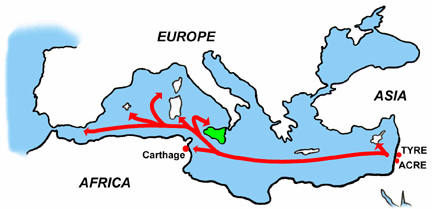Phoenician Settlement
of Sicily
Phoenicia, the kingdom that arose in Canaan with capitals at Tyre and
Sidon, was the first great colonizing power of the Mediterranean. Leveraging
their superior seafaring skills--which some say were learned from Crete--the
Phoenicians by about 1200 BC were trading at coastal towns across the
whole Mediterranean. Distant Spain proved to be a particularly lucrative
destination.

In time their trading led to their maintaining small commercial enclaves
abroad. By 1000 BC the Phoenicians had begun establishing permanent
colonies in Sicily and along the coast of North Africa. Colonies were
also planted at Cyprus, Malta, Sardinia, Corsica and the coast of present-day
Spain. The most important Phoenician city in Sicily was Palermo [Panormus].
The most famous and successful of all the Phoenician colonies was legendary
Carthage, sited on the North African coast opposite Sicily. Founded
by Dido, daughter of King Mutton I of Tyre, in 813 BC, Carthage grew
in power as the fortunes of Phoenicia itself declined. Finally Carthage
emerged as ruler of the colonies that Phoenicia had established along
the shores of the central and western Mediterranean.
RETURN TO TIMELINE
©
1999 C. I. Gable |
